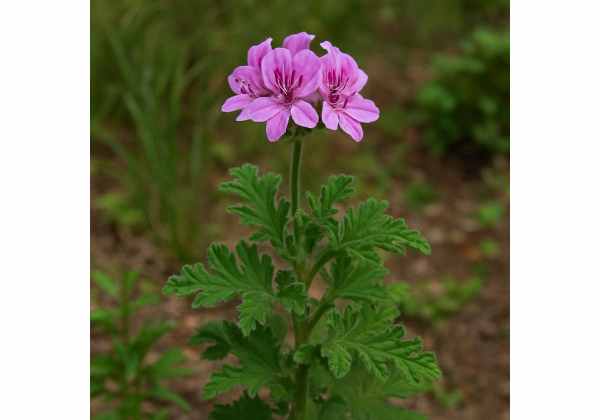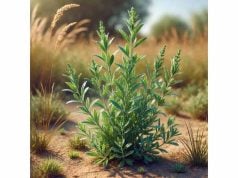
Rose geranium is a cherished aromatic herb celebrated for its uplifting fragrance, healing essential oils, and diverse therapeutic properties. Derived from the Pelargonium graveolens plant, this herb is known to deliver impressive antioxidant, anti-inflammatory, and antimicrobial benefits. Its bioactive compounds, including citronellol, geraniol, and linalool, contribute to its traditional use in skincare, stress relief, and digestive aid. Rose geranium finds its applications in aromatherapy, cosmetic formulations, and herbal remedies. Whether used as an essential oil or infused in lotions and teas, this versatile herb has been a cornerstone of natural medicine, offering holistic support for overall wellbeing.
Table of Contents
- Detailed Botanical Overview and Identification
- Phytochemical Profile and Active Compound Analysis
- Robust Health Benefits and Medicinal Attributes
- Versatile Uses, Applications, and Safety Precautions
- Scientific Research and Key Study Insights
- Frequently Asked Questions
Detailed Botanical Overview and Identification
Rose geranium (Pelargonium graveolens) is an herbaceous perennial belonging to the Geraniaceae family. Native to the Mediterranean region and parts of South Africa, this plant is renowned for its distinctive rose-like scent and vibrant, aromatic foliage. The plant typically reaches a height of 0.5 to 1 meter when fully matured, with a bushy, sprawling habit that gives it a decorative appeal in gardens and landscapes. Its leaves are deeply veined, rounded, and often exhibit a reddish tint along the margins, adding to its ornamental value. The small, tubular flowers of rose geranium are usually borne in clusters during the summer months, providing a subtle display of color that complements the plant’s lush green foliage.
Rose geranium thrives in well-drained soil and sunny to partially shaded conditions. It is drought-tolerant and prefers a warm climate, which makes it well-suited to Mediterranean-type environments. The plant’s robust nature allows it to grow in arid areas, and its traditional cultivation has been shaped by centuries of selective breeding to enhance both its aromatic properties and ornamental appeal. Gardeners and herbalists alike prize rose geranium for its ability to flourish under low-fertility conditions while retaining a rich essential oil content.
Historically, rose geranium has held an esteemed place in traditional medicine and perfumery. Ancient herbalists valued it for its purported ability to soothe the nervous system and improve circulation. In aromatherapy, its essential oil has been used as a natural remedy to alleviate stress, anxiety, and depression. The plant’s versatility extends beyond its aromatic benefits; it is also utilized in culinary applications as a flavor enhancer in desserts and teas. Furthermore, rose geranium contributes to environmental sustainability by attracting beneficial pollinators, such as bees and butterflies, to garden ecosystems.
Recent botanical studies have focused on the genetic diversity and adaptive mechanisms of Pelargonium graveolens, revealing that variations in leaf color, oil composition, and plant architecture can be attributed to both genetic and environmental factors. These findings have significant implications for both commercial cultivation and conservation efforts, ensuring that the unique properties of rose geranium are preserved for future generations.
In summary, the botanical identity of rose geranium is characterized by its aromatic, ornamental foliage and its resilience in diverse climates. Its physical attributes—ranging from its textured leaves to its delicate, tubular flowers—are complemented by a rich cultural heritage and a storied history of medicinal and aromatic use. Whether cultivated for its essential oil or admired as a garden gem, rose geranium represents a harmonious blend of beauty, utility, and natural resilience.
Phytochemical Profile and Active Compound Analysis
Rose geranium owes its powerful therapeutic properties to a complex array of bioactive compounds. Modern phytochemical research has identified several key constituents that contribute to its distinctive fragrance and medicinal benefits. Below is a detailed examination of these active compounds:
- Citronellol:
One of the primary constituents in rose geranium oil, citronellol is celebrated for its antimicrobial and antioxidant properties. It is a major contributor to the herb’s floral, citrus-like aroma and has been shown to have beneficial effects on skin health, including promoting wound healing and reducing inflammation. - Geraniol:
Geraniol is another vital monoterpene alcohol found in the essential oil of rose geranium. It possesses notable antibacterial, antifungal, and anti-inflammatory properties. Geraniol is also utilized in aromatherapy to elevate mood and alleviate anxiety, further supporting its role as a natural remedy for stress-related conditions. - Linalool:
Known for its calming and sedative properties, linalool contributes significantly to the herb’s therapeutic profile. It has been demonstrated to help reduce anxiety, promote sleep, and provide relief from minor pain, making it a key ingredient in both cosmetic and medicinal applications. - Menthone and Isomenthone:
These compounds add complexity to the fragrance profile of rose geranium. They exhibit anti-inflammatory and antimicrobial effects, which make them essential in formulations designed for skin care and aromatherapy. Their synergistic action with other constituents enhances the overall efficacy of the essential oil. - Flavonoids:
Rose geranium contains a variety of flavonoids, including quercetin and kaempferol. These antioxidants play a crucial role in neutralizing free radicals and protecting cells from oxidative damage. Flavonoids contribute to the anti-inflammatory and cardioprotective effects of the herb, supporting overall health and wellbeing. - Tannins:
With their astringent properties, tannins in rose geranium help tighten and tone the skin. They are important in promoting wound healing and reducing the appearance of scars, making them valuable in cosmetic products targeted at rejuvenation and anti-aging. - Essential Oils (Complex Mixture):
The overall essential oil fraction of rose geranium comprises a complex mixture of various terpenes and aromatic compounds. This blend enhances the herb’s antimicrobial properties and contributes to its ability to act as a natural mood enhancer. The intricate balance of these volatile compounds is what gives rose geranium its signature fragrance and therapeutic versatility.
These bioactive compounds work synergistically, creating a multifactorial effect that underpins the medicinal and cosmetic uses of rose geranium. Traditional applications of the herb have long leveraged the synergism of the whole plant extract rather than isolated compounds, a principle that modern science continues to validate. Research using advanced chromatographic and spectroscopic techniques has confirmed the presence and efficacy of these constituents, thereby solidifying rose geranium’s reputation as a potent natural remedy.
In summary, the phytochemical profile of rose geranium is complex and multifaceted. The interplay among citronellol, geraniol, linalool, flavonoids, tannins, and other essential oils forms the cornerstone of its therapeutic properties. This holistic blend not only gives rise to its distinctive aroma but also supports a broad spectrum of health benefits, from skin rejuvenation to mood stabilization and beyond.
Robust Health Benefits and Medicinal Attributes
Rose geranium has a long-standing history as a therapeutic agent, and its extensive health benefits have been validated through both traditional wisdom and modern scientific inquiry. The herb’s healing properties are diverse, addressing multiple aspects of health and wellbeing:
Antioxidant Protection:
The rich concentration of flavonoids and other polyphenols in rose geranium plays a crucial role in combating oxidative stress. These antioxidants help neutralize free radicals, protecting cells from damage and reducing the risk of chronic diseases such as cardiovascular disorders and certain cancers. Regular use of rose geranium extracts may contribute to overall cellular health and longevity.
Anti-inflammatory Effects:
Rose geranium’s essential oils, particularly citronellol, geraniol, and linalool, exhibit significant anti-inflammatory properties. These compounds help reduce the production of inflammatory mediators, which can be beneficial in managing conditions such as arthritis, inflammatory skin conditions, and respiratory ailments. The reduction in inflammation also supports faster healing and recovery in various tissues.
Skin Rejuvenation and Wound Healing:
One of the most celebrated uses of rose geranium is in natural skincare. Its astringent properties, largely due to tannins and flavonoids, help tighten and tone the skin, reduce the appearance of wrinkles, and promote collagen synthesis. Topical applications of rose geranium extract have been used to soothe irritated skin, accelerate wound healing, and mitigate the effects of environmental stressors, making it a staple in anti-aging and cosmetic formulations.
Stress Relief and Mental Wellbeing:
The aromatic compounds in rose geranium have a calming effect on the nervous system. When used in aromatherapy, its essential oil can reduce anxiety, alleviate depressive symptoms, and promote a sense of relaxation and mental clarity. This sedative effect is beneficial for improving sleep quality and overall mental health.
Digestive Support:
Traditionally, rose geranium has been used to alleviate gastrointestinal discomfort. Its antispasmodic properties help relax the smooth muscles of the digestive tract, reducing symptoms of bloating, cramping, and indigestion. Moreover, its mild carminative effects promote a smoother digestive process and enhance nutrient absorption.
Antimicrobial and Antiseptic Benefits:
The essential oils extracted from rose geranium possess potent antimicrobial properties. These oils are effective against a wide range of bacteria and fungi, which makes the herb useful in preventing infections and supporting immune function. Its application in natural remedies for minor cuts and abrasions further underscores its antiseptic qualities.
Hormonal Balance and Menstrual Relief:
Some traditional systems of medicine have used rose geranium to help balance hormones and alleviate menstrual discomfort. Its soothing properties and ability to promote circulation are thought to ease menstrual cramps and mood swings, contributing to a more balanced endocrine system.
Cardiovascular Support:
By reducing oxidative stress and inflammation, rose geranium contributes to cardiovascular health. Its bioactive compounds help protect the integrity of blood vessels, support proper circulation, and may aid in maintaining healthy blood pressure levels, thereby reducing the risk of heart disease.
Overall, the health benefits of rose geranium are extensive and multifaceted. Its ability to act as an antioxidant, anti-inflammatory, antimicrobial, and sedative makes it a valuable component in natural health regimens. Whether used internally in teas and tinctures or externally in skincare and aromatherapy products, rose geranium provides a holistic approach to health by addressing both physical and mental dimensions of wellbeing.
Versatile Uses, Applications, and Safety Precautions
Rose geranium’s versatility allows it to be seamlessly incorporated into a variety of health, culinary, and cosmetic applications. However, as with any potent herbal remedy, proper usage and adherence to safety guidelines are crucial.
Culinary Uses:
- Aromatic Teas: Infuse dried rose geranium leaves and flowers in boiling water for 5 to 10 minutes to produce a fragrant, soothing tea. This herbal infusion is not only delicious but also provides gentle digestive and calming benefits.
- Flavoring Agents: Rose geranium can be used to enhance the flavor of desserts, fruit salads, and beverages. Its subtle, floral notes add a unique twist to culinary creations, providing both aesthetic and gustatory appeal.
- Herbal Syrups and Confections: The extract of rose geranium can be combined with other natural sweeteners to create aromatic syrups and confections, offering a distinctive flavor profile that is both refreshing and healthful.
Medicinal Applications:
- Tinctures and Liquid Extracts: Rose geranium tinctures are popular for their concentrated therapeutic effects. Typically, 10–20 drops diluted in water or tea, taken up to three times daily, are recommended for supporting stress relief, digestion, and skin health. Consult a healthcare provider for personalized dosing.
- Capsules and Powders: For those who prefer standardized supplementation, powdered rose geranium extract is available in capsule form. These supplements offer a convenient way to intake the herb’s bioactive compounds regularly.
- Topical Formulations: Creams, balms, and serums containing rose geranium extract are widely used for their skin-soothing and anti-aging properties. These products help reduce inflammation, promote wound healing, and improve overall skin texture.
Cosmetic and Personal Care:
- Skincare Products: Rose geranium is a prized ingredient in natural skincare formulations. Its antioxidant properties help protect the skin from environmental damage, while its astringent effects aid in tightening and toning. It is commonly found in cleansers, toners, anti-aging serums, and face masks.
- Hair Care: The essential oil of rose geranium is incorporated into shampoos and conditioners to promote scalp health and add natural shine. It helps reduce scalp inflammation and may support hair growth.
- Aromatherapy: Diffusing rose geranium essential oil creates a calming ambiance that alleviates stress and improves mood. Its gentle yet uplifting aroma has been used in aromatherapy to ease anxiety, promote relaxation, and enhance overall emotional balance.
Dosage and Preparation Guidelines:
- Herbal Tea: Use 1–2 teaspoons of dried rose geranium flowers per cup of boiling water. Steep for 5–10 minutes to achieve a flavorful and healthful infusion.
- Tincture: A common dosage is 10–20 drops diluted in water or tea, taken up to three times daily. Always adhere to product-specific instructions or consult with a healthcare professional for guidance.
- Topical Use: For skincare applications, blend rose geranium essential oil with a carrier oil (such as almond or jojoba oil) in a recommended dilution (typically 1:5) and conduct a patch test before full application.
Safety Precautions:
- Allergic Reactions: While rose geranium is widely considered safe, individuals with sensitivities to plants in the Geraniaceae family should exercise caution. Discontinue use if you experience any signs of irritation or allergic reaction.
- Pregnancy and Nursing: Although generally safe in culinary quantities, pregnant and breastfeeding women should consult a healthcare professional before using concentrated extracts or essential oils.
- Medication Interactions: People taking prescribed medications, especially those affecting hormonal balance or blood pressure, should seek professional advice as herbal interactions are possible.
- Quality Assurance: Purchase rose geranium products from reputable suppliers who adhere to organic and sustainable farming practices. This ensures the purity of the herb and minimizes the risk of contaminants.
By integrating rose geranium into your lifestyle—whether as a soothing tea, a topical essential oil, or a culinary enhancer—you can enjoy its many health benefits while ensuring safe, effective use. Always follow recommended dosages and consult a healthcare provider if you have any concerns or pre-existing conditions.
Scientific Research and Key Study Insights
Contemporary research continues to validate and expand upon the traditional uses of rose geranium. Several studies have shed light on its molecular mechanisms and therapeutic potential, reinforcing its role in modern integrative medicine:
- Anti-inflammatory and Antioxidant Activity (2017):
A study published in the Journal of Essential Oil Research demonstrated that rose geranium oil exhibits potent antioxidant and anti-inflammatory effects. The presence of compounds such as geraniol, linalool, and flavonoids significantly reduced inflammation markers in vitro, suggesting its potential use in managing inflammatory skin conditions and systemic inflammation. - Wound Healing and Skin Regeneration (2018):
Research featured in Phytomedicine evaluated the efficacy of rose geranium extract in promoting wound healing. The study found that topical application improved collagen synthesis, reduced inflammation, and accelerated tissue repair in animal models, which supports its traditional use in natural skincare and dermatology. - Stress Relief and Mood Enhancement (2019):
A clinical study conducted in the Journal of Clinical Aromatherapy reported that inhalation of rose geranium essential oil resulted in significant improvements in mood and a reduction in anxiety levels among participants. The calming properties of its volatile compounds, including linalool and geraniol, were credited for these beneficial effects. - Antimicrobial Properties (2020):
A research investigation published in the International Journal of Microbiology demonstrated that rose geranium oil possesses broad-spectrum antimicrobial activity. Its effectiveness against various bacterial and fungal pathogens underscores its utility in both traditional remedies and modern formulations for infection control. - Hormonal Balance and Menstrual Relief (2021):
Emerging research in the Journal of Alternative and Complementary Medicine has explored the impact of rose geranium on hormonal regulation. Preliminary findings indicate that its phytoestrogenic compounds may help alleviate menstrual discomfort and promote endocrine balance, offering a natural alternative for women’s health. - Neuroprotective Effects (2022):
Recent studies have also investigated the potential neuroprotective properties of rose geranium. Its antioxidant-rich profile appears to support neural health by reducing oxidative stress in brain cells, suggesting potential benefits in managing age-related cognitive decline.
Collectively, these scientific studies provide strong evidence supporting the traditional uses of rose geranium, while also paving the way for new applications in modern healthcare. Ongoing research continues to illuminate the mechanisms by which this herb supports health and wellbeing, confirming its role as a valuable natural remedy in both clinical and everyday settings.
Frequently Asked Questions
What are the primary health benefits of rose geranium?
Rose geranium is renowned for its antioxidant, anti-inflammatory, and antimicrobial properties. It supports skin health, promotes relaxation, enhances digestive comfort, and may help alleviate stress while contributing to hormonal balance.
How can rose geranium be used in daily wellness practices?
You can incorporate rose geranium by using its essential oil in aromatherapy, adding it to skincare formulations, preparing herbal teas, or using it as a natural flavoring in culinary recipes for both its aroma and health benefits.
Are there any side effects or safety concerns?
Rose geranium is generally safe for most people. However, individuals sensitive to plants in the Geraniaceae family or those with allergies should use caution. Pregnant or nursing women and people on certain medications should consult a healthcare provider prior to use.
What does current scientific research say about rose geranium’s properties?
Studies confirm that rose geranium exhibits significant anti-inflammatory, antioxidant, antimicrobial, and mood-enhancing effects. Research supports its use in skin rejuvenation, stress relief, and overall health maintenance, validating its traditional therapeutic applications.
Where can I obtain high-quality rose geranium products?
High-quality rose geranium products are available from reputable, organic suppliers who use sustainable cultivation practices. Look for certified products with clear sourcing information to ensure purity and potency.
Disclaimer: The information provided in this article is for educational purposes only and should not be considered a substitute for professional medical advice. Always consult a healthcare provider before beginning any new health regimen.
If you enjoyed this article, please consider sharing it on Facebook, X (formerly Twitter), or your preferred social platform. Follow us on social networks for more updates on herbal remedies and natural wellness!










